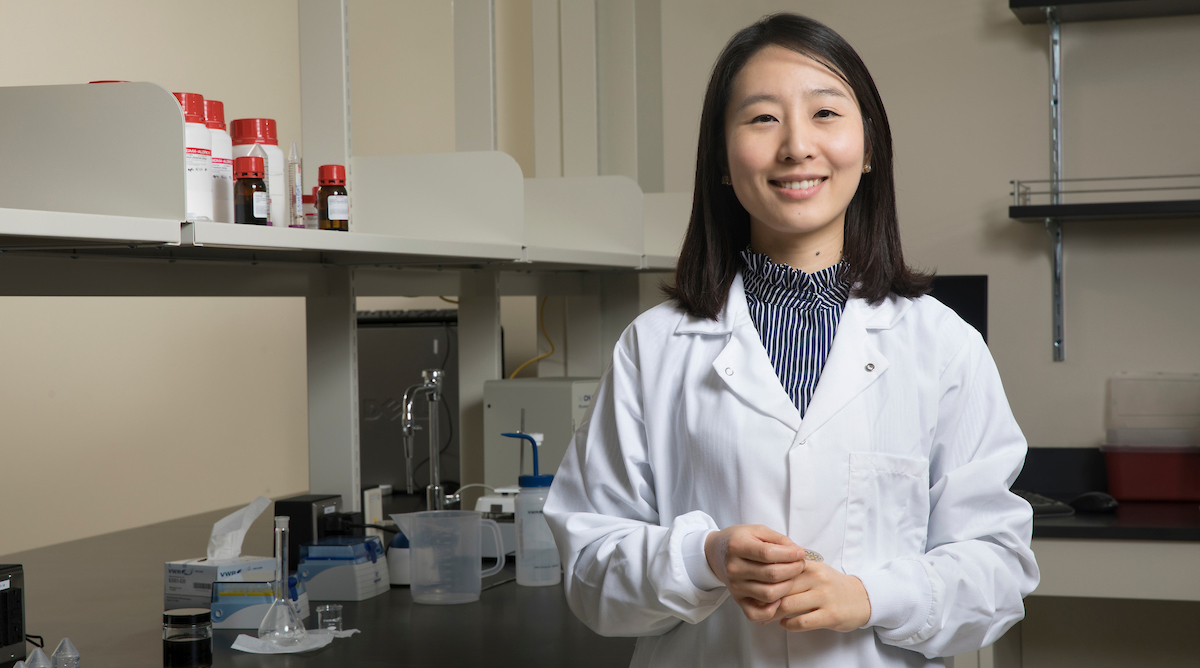Assistant professor wins NSF CAREER Award to develop better biosensors
$500,120 grant to fund research into flexible, porous material that offers more accurate results

Since joining the Binghamton University faculty in 2016, Assistant Professor Ahyeon Koh has focused her research on creating better biosensors.
From smart bandages and papertronics to sweat analysis and upcycling old CDs, Koh’s work aims to offer us the real-time data that ultimately could improve our health and well-being. The key is getting that information in a reliable and consistent way.
Koh — from the Thomas J. Watson College of Engineering and Applied Science’s Department of Biomedical Engineering — recently received a five-year, $500,120 National Science Foundation CAREER Award to fund the next phase in her endeavors. A CAREER grant supports early career faculty who have the potential to serve as academic role models in research and education.
The funding will aid research into better ways to attach biosensors. Koh has developed a flexible, porous material made from polydimethylsiloxane (PDMS), a nontoxic silicone commonly used for biomedical purposes, which she says is better than the nonporous film that is most common now.
“No matter what kind of thin film you are using, there is a barrier between the biology and the electronics,” Koh said. “If you want to do some kind of measurement, the analyte builds up underneath that film — not just biochemical components, but also heat and sweat. It creates significant problems for accuracy and reliability and may cause skin irritation.”
Koh’s NSF project will fabricate and study the sensors to validate critical biomarker concentrations in real time on the skin. She believes that having a porous structure that mimics human skin will improve the results.
“The breathability gives us more accurate measurements — we already proved that with electrocardiogram measurements in sweating situations,” she said. “We want to see more beyond that to measure the chemical components that are closely related to certain diseases.”
In addition to research, the CAREER Award includes an educational element: Koh will oversee the development of an inexpensive learning kit to help K-12 students better understand biomedical engineering fundamentals.
She plans to work with her own students as well as undergraduates from Binghamton University’s Biomedical Engineering Society and Alpha Omega Epsilon professional engineering and science sorority. (She serves as faculty advisor to both groups.) The University’s Master Teacher Program will help to make connections at schools in the region.
“I’ve had good support from our department as well as the Master Teacher Program,” she said. “Before COVID, we used to present our research at local schools, and that got younger students interested in biomedical engineering and STEM careers.”
Koh is appreciative of all the help and funding she has received since coming to Binghamton.
“I’m thankful for the previous NSF awards I have received, internal funding support from the Binghamton University/UHS seed grant program and elsewhere, collaborators and mentors at Watson College, staff at the Center of Excellence in Small Scale Systems Integration and Packaging (S3IP) and the Division of Research, and current and previous members of my research group,” she said.

